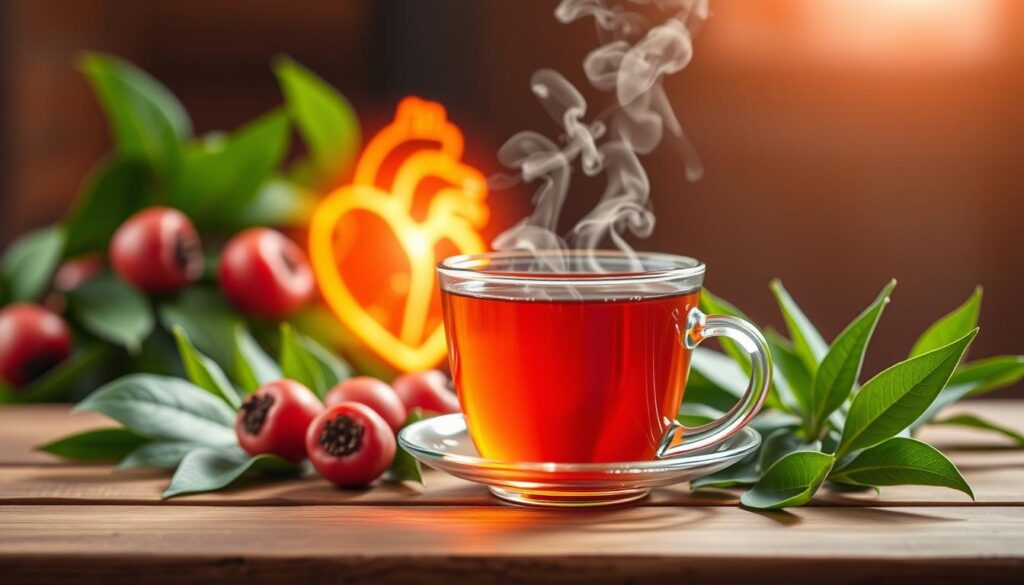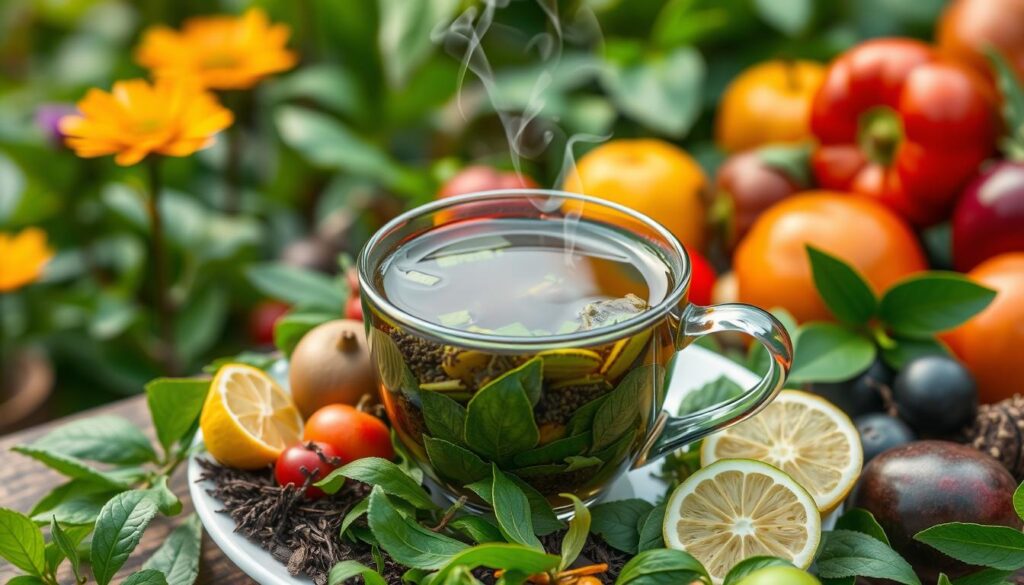The Best Fluffy Pancakes recipe you will fall in love with. Full of tips and tricks to help you make the best pancakes.

Do you wonder about the health benefits of your morning tea? Let’s explore oolong tea, a traditional Chinese tea. It’s been loved for centuries for its unique health benefits.
Oolong tea comes from the leaves of the Camellia sinensis plant, partially oxidized. It has a wide range of flavors, from floral to toasty. But it’s not just about taste. It’s packed with health-boosting compounds that can change your life.
Key Takeaways
- Oolong tea is a traditional Chinese tea with numerous health benefits
- It contains a unique blend of antioxidants, caffeine, and polyphenols that support overall wellness
- Regular consumption of oolong tea can boost metabolism, aid in weight management, and improve heart health
- Oolong tea enhances mental focus, reduces stress, and promotes healthy skin and digestion
- Incorporating oolong tea into your daily routine can be a transformative step towards a healthier, more vibrant lifestyle
Understanding Oolong Tea: Origin and Processing
Oolong tea comes from China and Taiwan’s green hills. It’s known for its special processing and flavors. This tea is made with care, showing the deep history of tea-making.
Traditional Chinese Processing Methods
Tea starts with picking tea leaves from the Camellia sinensis plant. These leaves go through steps like withering, rolling, oxidation, and firing. Each step shapes the tea’s unique taste.
- Withering: Leaves are spread out to dry, starting to develop flavors and smells.
- Rolling: Leaves are rolled to start oxidation, changing their taste.
- Oxidation: Leaves are allowed to oxidize partially, affecting the tea’s taste.
- Firing: Leaves are baked to stop oxidation, preserving the flavor and smell.
Different Oxidation Levels Explained
Oolong tea’s taste varies with oxidation levels, from 8% to 80%. Lightly oxidized teas, like Tieguanyin, have a floral aroma and smooth taste. Heavily oxidized teas, like Da Hong Pao, have a richer taste with caramel and spice notes.
Cultivar Varieties and Growing Regions
Oolong tea grows in China and Taiwan, with each place having its own tea. Tieguanyin from Fujian and Da Hong Pao from the Wuyi Mountains are famous. These teas show a wide range of oolong teas.
“Oolong tea is a testament to the artistry and passion of tea growers and processors, who have perfected the craft over generations.”
The Unique Nutritional Profile of Oolong Tea
Oolong tea is a fascinating drink with a special nutritional profile. It’s calorie-free and packed with good stuff for your health. An 8-ounce serving has 30 to 50 milligrams of caffeine, 0.3 milligrams of fluoride, 12 milligrams of potassium, and 0.3 milligrams of manganese.
Oolong tea shines with its high antioxidant content. It’s full of polyphenols like catechins and theaflavins. These are known for fighting free radicals and keeping cells healthy. This makes oolong tea a top pick for healthy drinks.
Oolong tea also has other great nutrients. L-theanine in it can improve brain function, help you relax, and boost your immune system. Plus, its minerals like fluoride and manganese are good for strong bones and teeth.
If you want to speed up your metabolism, support heart health, or just enjoy a tasty, healthy drink, oolong tea is perfect. Adding it to your daily routine can help keep you healthy and happy.
Metabolism and Weight Management Benefits
Oolong tea is known for boosting metabolism and aiding in weight management. Its unique compounds can affect fat oxidation, thermogenesis, and appetite control.
Impact on Fat Oxidation
Oolong tea’s polyphenols, like catechins and theaflavins, boost fat burning. They work by reducing the breakdown of fats in the body. This helps in keeping the body leaner.
Thermogenic Properties
Oolong tea’s mix of caffeine and catechins increases energy use and calorie burning. Studies show it can raise calorie burn by up to 3.4%. This leads to more fat loss over time.
Appetite Control Effects
Oolong tea’s tannins act as natural appetite suppressants. They help you feel full, preventing overeating. This supports weight management efforts.
Drinking oolong tea regularly, along with a healthy diet and exercise, can improve body composition and health.
Cardiovascular Health Advantages
Oolong tea is great for your heart. It can lower your risk of heart disease and stroke. It does this by improving your blood lipid profiles.
It helps lower bad cholesterol and boost good cholesterol. The antioxidants in oolong tea also improve blood flow and lower blood pressure. These benefits make oolong tea a great choice for a heart-healthy lifestyle.
Research shows oolong tea can help control blood sugar and insulin resistance. These are key for heart health. The tea’s polyphenols and other compounds also fight inflammation. This can help prevent atherosclerosis, a major heart disease cause.
In a 2022 study, oolong tea was linked to a lower risk of heart disease and high blood pressure. This is because it improves blood vessel function and endothelial health.
| Cardiovascular Health Benefits of Oolong Tea | Impact |
|---|---|
| Lowers LDL (bad) cholesterol | Reduces the risk of heart disease and stroke |
| Supports HDL (good) cholesterol levels | Improves overall cholesterol profile |
| Reduces blood pressure | Lowers the risk of hypertension and related conditions |
| Possesses anti-inflammatory properties | Helps prevent the development of atherosclerosis |
Adding oolong tea to your daily routine can boost your heart health. Its antioxidants and bioactive compounds are powerful for a healthy heart.

Mental Clarity and Cognitive Function
Oolong tea is more than a tasty drink; it’s a brain booster. It contains L-theanine, an amino acid that relaxes and sharpens focus. This makes it perfect for those looking to improve their mental clarity and cognitive skills.
The tea’s caffeine gives you a gentle energy boost. It keeps you alert and focused without the coffee jitters. The mix of caffeine and L-theanine enhances calm concentration. Drinking oolong tea regularly can sharpen your mind and lower stress, making tasks easier.
L-theanine and Focus Enhancement
L-theanine is the key to oolong tea’s brain benefits. It crosses the blood-brain barrier to affect neurotransmitters and brain waves. This leads to a calm yet alert state, helping you stay focused without feeling anxious.
Stress Reduction Properties
Oolong tea’s L-theanine also helps reduce stress. It balances neurotransmitters like serotonin and dopamine, calming the mind. Drinking oolong tea regularly can be a natural way to manage stress and improve mental health.
Brain Health Protection
Oolong tea may also protect your brain from aging. Its antioxidants and polyphenols could lower the risk of Alzheimer’s and Parkinson’s. This makes oolong tea a potential long-term brain health ally.
Adding oolong tea to your daily routine can boost your mental clarity and focus. Discover how this ancient drink can transform your mind.
Digestive System Support and Gut Health
Oolong tea is more than just a tasty drink. It’s great for your digestive system and gut health. Its special compounds help with digestion, reduce bloating, and improve how your body absorbs nutrients.
Tea’s anti-inflammatory properties can calm your digestive tract. This might help with acid reflux and indigestion. Research shows tea has more catechins than black tea but less than green tea.
In your gut, oolong tea is a game-changer. It helps good bacteria grow, which is key for your health and mood. Drinking two cups of green tea a day for two weeks can boost healthy gut bacteria.
The tea’s polysaccharides, with their mix of sugar and protein, are good for your gut. Oolong tea’s unique polysaccharides set it apart, offering extra digestive health benefits.
“Drinking between two and five cups of tea daily may increase the healthy bacteria in your gut.”
If you want to boost your digestive health and gut microbiome, try tea. It’s soothing and nourishing, making it a great addition to your daily routine.

Antioxidant Properties and Skin Benefits
Oolong tea is more than just a drink. It’s packed with antioxidants that help your skin stay healthy and young. The compounds in tea fight off free radicals and protect your skin from damage.
Free Radical Protection
A study in the Journal of Dermatological Science found oolong tea improves skin elasticity. It also reduces aging signs. This is because of its high antioxidant levels.
These antioxidants stop free radicals from harming your skin cells. This helps prevent early aging.
Anti-aging Effects
Oolong tea’s antioxidants do more than just protect your skin. A study in the Chinese Journal of Integrative Medicine showed it can reduce body fat. This makes you look younger and more vibrant.
Skin Condition Management
tea also helps with skin conditions due to its anti-inflammatory properties. A study in Phytomedicine found it supports a healthy gut. This is good for your skin.
Tea keeps your skin hydrated and balanced. Adding it to your daily routine can greatly benefit your skin’s health.
How to Properly Brew Oolong Tea
To brew the perfect tea, pay attention to a few important details. Start with 1-2 teaspoons of loose tea leaves for every 8 ounces of water. The best steeping temperature is 195 degrees Fahrenheit.
Heat your water to this range, around 85-96°C. This temperature helps bring out the tea’s full flavor and aroma.
Before steeping, you can rinse the tea leaves. This step opens up the leaves and improves the tea’s taste. Steep the leaves for 3 to 5 minutes. Adjust the time based on your taste and the tea variety.
For iced tea, use two to three times more tea leaves. This means 2 to 3 teaspoons for every 8 ounces. For cold brew, use a tablespoon of tea leaves for 1.5 cups of water. Steep for at least 4 hours, or up to 10 hours for the best flavor.
Using teaware like tea kettles and teapots from brands like Teabloom makes brewing easier. These items can be heated directly on the stovetop. Remember, use about 1 teaspoon of tea per 8 ounces of hot water as a general rule.
By following these steps, you can fully enjoy your tea. You’ll appreciate its unique flavor and health benefits with every sip.
Conclusion
Adding tea to your daily routine can greatly boost your health. It helps with weight loss, heart health, and even mental focus. Its unique taste makes it a great choice for a healthy lifestyle.
Drinking tea regularly, along with a healthy diet and exercise, can lead to lasting health gains. It’s packed with antioxidants and nutrients that support weight loss, heart health, and brain function. It also helps with digestion.
Start enjoying tea every day. It’s a simple way to improve your health and feel more alive. Let tea be your partner in achieving your wellness goals.
FAQ
What is oolong tea and what are its health benefits?
Tea is a Chinese tea made from partially oxidized leaves. It boosts metabolism and supports heart health. It also enhances mental alertness and improves skin condition.
Tea has caffeine, antioxidants, and polyphenols. These make it great for a healthy lifestyle.
Where does oolong tea come from and how is it processed?
Tea comes from China and Taiwan. It has a rich history of cultivation and processing. The leaves are partially oxidized, giving it different flavors and aromas.
Traditional methods include withering, rolling, oxidizing, and firing. Famous varieties like Tieguanyin and Da Hong Pao have unique characteristics.
What is the nutritional profile of tea?
Tea is calorie-free and full of good stuff. An 8 oz serving has 30-50 mg of caffeine and 0.3-0.5 mg of fluoride. It also has 12 mg of potassium and 0.3 mg of manganese.
It’s packed with antioxidants and polyphenols. These nutrients make tea great for wellness.
How does tea boost metabolism and support weight management?
Tea boosts metabolism and aids in weight management. Its polyphenols help burn fat. Caffeine and catechins increase calorie burning.
Tannins in oolong tea help you feel full. This can lead to less body fat and better weight control.
What are the cardiovascular health benefits of oolong tea?
Tea is good for your heart. It may lower the risk of heart disease and stroke. It improves blood lipid profiles and blood circulation.
Its antioxidants can also lower blood pressure. This makes tea great for heart health.
How does oolong tea support mental clarity and cognitive function?
Tea has L-theanine, which relaxes and focuses the mind. It increases alpha brain waves for better mental clarity. The caffeine in oolong tea gives energy without jitters.
Regularly drinking tea may protect brain cells. This could lower the risk of Alzheimer’s and Parkinson’s diseases.
What are the digestive and gut health benefits of oolong tea?
Tea aids digestion and supports a healthy gut. Its polyphenols stimulate digestive enzymes. This reduces bloating and improves nutrient absorption.
The tea’s anti-inflammatory properties soothe the digestive tract. This can help with acid reflux and indigestion. Tea also supports beneficial gut bacteria for overall health.
How does oolong tea benefit the skin?
Tea’s antioxidants protect the skin from damage. Regularly drinking it can improve skin elasticity and reduce aging signs. Its anti-inflammatory properties may help with eczema.
Tea also promotes hydration and balances electrolytes. This contributes to healthy skin and a youthful look.
How should I brew oolong tea to maximize its benefits?
Use 1-2 teaspoons of loose leaves for every 8 oz of water. Heat the water to 185°F-205°F (85°C-96°C). Optional leaf rinsing can enhance flavor.
Steep for 1-5 minutes, adjusting to taste. Oolong leaves can be re-steeped 2-3 times. Proper brewing enhances flavor and health benefits.









